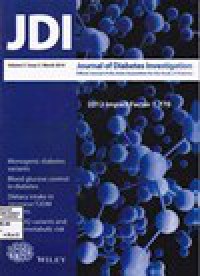
Jurnal
Injection of Lactobacillus casei strain Shirota affects autonomic nerve activities in a tissue-specific manner, and regulates glucose and lipid metabolism in rats
Aims/Introduction: Previously, it was observed that long-term ingestion of a probiotic strain Lactobacillus casei Shirota (LcS) ameliorates insulin resistance and glucose intolerance in rats fed a high-fat diet. In the present study, we examined its possible role in the autonomic nervous system during LcS-induced modulations in glucose and lipid metabolism or cardiovascular functions. Materials and Methods: The present study examined the effects of intragastric (IG) LcS injection on autonomic nerve tones in anesthetized rats by electrophysiological method. Results: We found that an IG injection of LcS suppressed neural activity of sympathetic nerves supplying the white adipose tissue of urethane-anesthetized rats in a dose-dependent manner, whereas sympathetic nerve outflow to brown adipose tissue was not affected by the IG LcS injection. Furthermore, the IG LcS injection reduced efferent sympathetic nerve outflow to the adrenal gland and liver, but did not alter gastric vagal nerve activity, renal sympathetic nerve activity, as well as mean arterial pressure. To test the involvement of afferent vagal nerves and the abdominal organs, we examined the adrenal sympathetic response to an LcS injection in rats with ablated afferent vagal nerves, and found that the adrenal sympathetic nerve response to LcS was inhibited in vagotomized rats. In addition, we found that oral ingestion of LcS attenuated the hyperglycemic response to glucose loading and blood glycerol levels in conscious rats. Conclusions: Our data suggest that LcS might affect tissue-specific autonomic nerves through the afferent vagal nerve pathway to modulate glucose and lipid metabolism.
Availability
No copy data
Detail Information
- Series Title
-
JDI Jurnal of Diabetes Investigation Volume 5, Issue 2 March 2014
- Call Number
-
(05) 616.46 WIL j
- Publisher
- Australia : Wiley., 2014
- Collation
-
Hlm. 153-161
- Language
-
English
- ISBN/ISSN
-
2040-1124
- Classification
-
(05) 616.46 WIL j
- Content Type
-
-
- Media Type
-
-
- Carrier Type
-
-
- Edition
-
Volume 5, Issue 2
- Subject(s)
- Specific Detail Info
-
-
- Statement of Responsibility
-
-
Other version/related
No other version available
File Attachment
Comments
You must be logged in to post a comment
 Computer Science, Information & General Works
Computer Science, Information & General Works  Philosophy & Psychology
Philosophy & Psychology  Religion
Religion  Social Sciences
Social Sciences  Language
Language  Pure Science
Pure Science  Applied Sciences
Applied Sciences  Art & Recreation
Art & Recreation  Literature
Literature  History & Geography
History & Geography